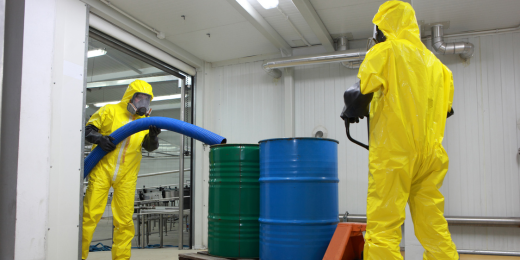The 8-Minute Rule for Reclaim Waste
The 8-Minute Rule for Reclaim Waste
Blog Article
Reclaim Waste - The Facts
Table of Contents4 Simple Techniques For Reclaim WasteAn Unbiased View of Reclaim Waste4 Simple Techniques For Reclaim WasteThe Definitive Guide for Reclaim WasteHow Reclaim Waste can Save You Time, Stress, and Money.
Check out the kinds, incidents, and forms of fluid waste. Domestic sewage waste describes the waste and products from a residential septic system. This type of waste is developed by human beings in houses, schools, and various other buildings. This only consists of septic systems that have a drain area. The proper monitoring and disposal of residential sewer waste need fluid waste to be transferred to a sewage treatment plant where the proper techniques and equipment are applied to cleanse and throw away waste.
Commercial waste commonly consists of potential risks, such as combustible products or a mix of fluid and strong waste products, and requires an advanced and detailed disposal process. The disposal of industrial waste commonly entails the filtration of waste before transportation to make sure secure and proper disposal. Industrial waste is produced from by-products and overflow of commercial procedures and manufacturing.
This sort of waste can not make use of the very same sewer management transportation or processes as septic or commercial liquids. The industrial waste management process calls for the examination and screening of fluid waste prior to it undergoes the disposal process (industrial wastewater treatment). Drainage waste is the fluid waste that originates from drainage and excess stormwater in very booming locations or cities
Overflow waste can trigger contamination and flooding otherwise taken care of properly. Find out extra concerning sewage system cleansing and waste administration. Making certain correct waste monitoring can protect against calamities and lower ecological harm. Both people in household setups and experts in commercial or manufacturing sectors can take advantage of understanding the procedures and guidelines of liquid waste management.
How Reclaim Waste can Save You Time, Stress, and Money.
Get in touch with PROS Providers today to find out about our waste management and disposal solutions and the proper methods to look after the liquid waste you create.
(https://reclaim-waste-48112599.hubspotpagebuilder.com/reclaim-waste/expert-liquid-waste-removal-and-disposal-services-your-complete-guide)This so-called 'wastewater' is not just a vital source but, after therapy, will be launched to our land, rivers or the ocean. Made use of water from bathrooms, showers, bathrooms, kitchen sinks, washings and industrial processes is recognized as wastewater.

water used to cool equipment or clean plant and devices). Stormwater, a kind of wastewater, is overflow that moves from agricultural and metropolitan locations such as roofing systems, parks, yards, roadways, paths and rain gutters right into stormwater drains, after rain. Stormwater moves without treatment straight to local creeks or rivers, ultimately getting to the ocean.
Not known Details About Reclaim Waste
In Queensland, many wastewater is dealt with at sewer therapy plants. Wastewater is moved from residential or commercial websites via a system of sewage systems and pump terminals, referred to as sewerage reticulation, to a sewer therapy plant. City governments construct, keep and run most sewer therapy plants. Operators are accredited under the Environmental Management Act 1994 to release cured wastewater at an acceptable environmental requirement into waterways.
The Department of Natural Resources advises neighborhood federal governments regarding managing, operating and maintaining sewerage systems and treatment plants. In unsewered locations, regional governments may call for homeowners to set up individual or house sewer treatment systems to treat residential wastewater from bathrooms, kitchens, bathrooms and washings. The Department of Natural Resources authorises the use of house systems when they are verified to be efficient.
In some brand-new class, treatment of some stormwater to eliminate clutter, sand and gravel has actually begun making use of gross pollutant catches. Wastewater therapy happens in 4 phases: Removes solid issue.
Utilizes little living organisms understands as micro-organisms to damage down and get rid of remaining dissolved wastes and great particles. Micro-organisms and wastes are integrated in the sludge.
What Does Reclaim Waste Do?
Nutrient elimination is not readily available at all sewer treatment plants because it requires expensive specialist equipment. Clear liquid effluent produced after therapy might still contain disease-causing micro-organisms - liquid waste disposal melbourne.

This generally indicates wastewater has actually to be treated or contaminants gotten rid of prior to it can be released to waterways. Many wastewater moves right into the sewage system. Under the Act, city governments administer approvals and licences for eco relevant tasks (Ages) a knockout post involving wastewater launches that may have a regional influence. The division administers authorizations and licences to Periods including wastewater launches that may have a local or statewide effect.
About Reclaim Waste
Or else, examples are taken for lab evaluation. Frequently lots of examinations are needed to establish the levels of each of the various toxins such as oils, heavy steels and pesticides in water. Tracking supplies factual details concerning water quality and can confirm that licence conditions are being satisfied. The details gotten via monitoring offers the basis for making water top quality choices.
Report this page